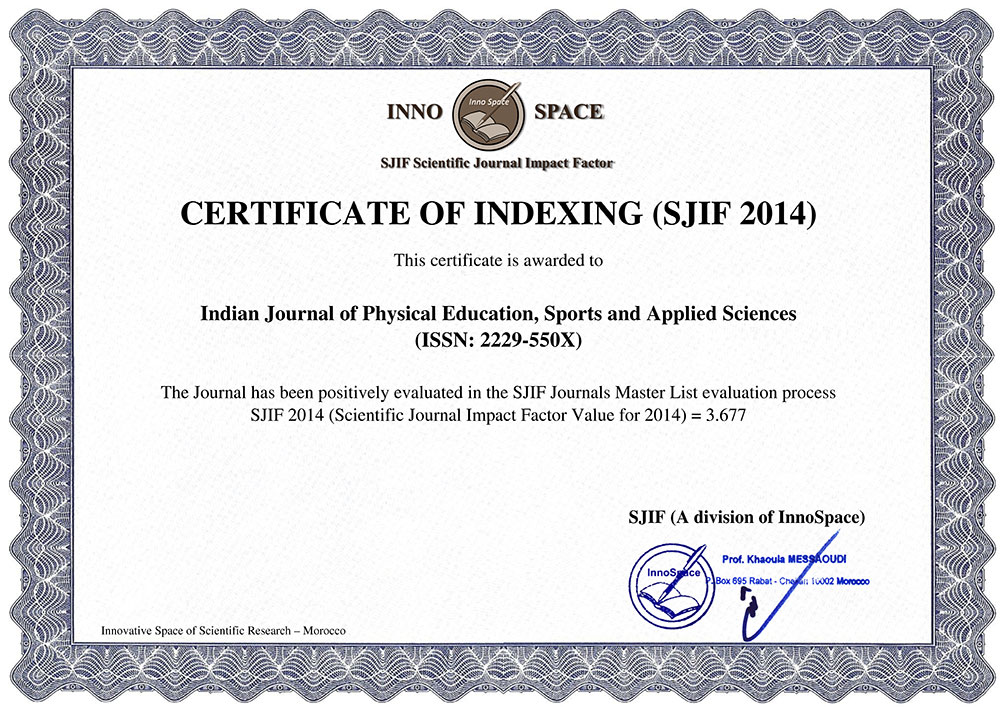INVESTIGATION OF JOB SATISFACTION AMONG SPORT COACHES WORKING IN URBAN REGION OF UTTAR PRADESH
2019, April, Volume 9-Number 2 May 9, 2019| Author name : | Arun Kumar Yadav, Dr. Rajkumar Sharma & Dr. Yuwraj Shrivastava | ||||
|---|---|---|---|---|---|
| Page no : | 93-98 | Volume : | 9 | Issue : | 2 |
doi no.: 05-2016-44975451, DOI Link :: http://doi-ds.org/doilink/05.2019-96823855/
Arun Kumar Yadav1, Dr. Rajkumar Sharma2 & Dr. Yuwraj Shrivastava3
Affiliations
1 Ph. D. Scholar, Department of Physical Education, Dr. C. V. Raman University, Kota Road, Bilaspur (Chhattisgarh)
2 Chief Coach,-Gymnastics, Sports Authority of India, STC Exr. Dhar, Malhar Ashram, Rambagh, Indore (M.P.)
3 Assistant Professor, Department of Physical Education, Dr. C. V. Raman University, Kota Road, Bilaspur (Chhattisgarh)
ABSTRACT
The purpose of the study was to analyse and investigate the job satisfaction of sport coaches in the urban Colleges and Universities of Varansi region. Thirty Five ( Males= 23, Females=12) coaches from colleges and universities located in urban region of Varanasi district . were selected as the sample for the study. The MSQ was used to measure job satisfaction. It is a gender neutral instrument that can be administered to either groups or to individuals. The instrument utilizes 20- dimension Likert-type scale format and samples both intrinsic and extrinsic reinforcement dimensions with a total of 100 items. To assess the personal and educational characteristics of male and female coaches, the numbers and percentages of male and female coaches were disaggregated and tabulated by the five demographic variables. To assess the frequencies of response for each of the 5 response options on the MSQ Likert Scale were analyzed. The results of the study revealed that coaches of different games and sports were satisfied in Policies, compensation, and responsibility and slightly Satisfied in rest of the dimensions of Job satisfaction. The sport coaches of both sex had a specialize diploma in coaching.
Keywords: Male, Female, Sport, Coach, Job, Satisfaction, Uttar pradesh.
DOWNLOAD FULL TEXT: 
BIBLIOGRAPHY
Education and National Development: Report of the Education Commission, 1964-66 – Vol I: General Problems” and Cited by Kainth, Gursharan Singh and Kaur, Gurinder, Job Satisfaction: A Challenging Area of Research in Education (March 12, 2011). https://ssrn.com/abstract=1784465 or http://dx.doi.org/10.2139/ssrn.1784465
Herzberg, F., Mausner, B., Patterson, R. O., & Capwell, D. F. (1957). Job attitude: Review of research and opinion. Pittsburgh: Psychological Services of Pittsburgh.
Mount, M., Ilies, R., & Johnson, E. (2006). Relationship of personality traits and counterproductive work behaviors: The mediating effects of job satisfaction. Personnel Psychology, 59, 591-622.
National Education Policy (1986). National Informatics Centre. pp. 38–45. Retrieved 12 July 2009.
Organ, D. W., & Ryan, K. (1995). A meta-analytic review of attitudinal and dispositional predictors of organizational citizenship behavior. Personnel Psychology, 48, 775-802
Saari, L. M., & Judge, T. A. (2004). Employee attitudes and job satisfaction. Human Resource Management, 43, 395-407.
Schultz, D. P. (1982). Psychology and industry today. New York: Macmillan, p. 287.
University of Minnesota. (1977). Minnesota Satisfaction Questionnaire. Minneapolis, MN: Author.
Wegge, J., Schmidt, K., Parkes, C., & van Dick, K. (2007). ‘Taking a sickie’: Job satisfaction and job involvement as interactive predictors of absenteeism in a public organization. Journal of Occupational and Organizational Psychology, 80, 77-89
Weiss, D. J., Davis, R. V., England, G. W., and Lofquist, L. H., (1967) “Manual for the Minnesota Satisfaction Questionnaire” in: Huang, H. J., (1999) Job Rotation from the Employees’ Point of View, Research & Practice in Human Resource Management, 7(1), 76.







